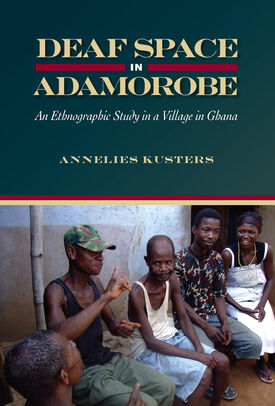
Deaf Space in Adamorobe
An Ethnographic Study in a Village in Ghana
1st Edition
This ethnographic study reveals how deaf people in Adamorobe created their own “Deaf Space” by seeking each other out to form a society of their own.
Description
Shared signing communities consist of a relatively high number of hereditarily deaf people living together with hearing people in relative isolation. In the United States, Martha’s Vineyard gained mythical fame as a paradise for deaf people where everyone signed up until the 19th century. That community disappeared when deaf people left the island, newcomers moved in, married locals, and changed the gene pool. These unique communities still exist, however, one being the Akan village in Ghana called Adamorobe. Annelies Kusters, a deaf anthropologist, traveled to Adamorobe to conduct an ethnographic study of how deaf and hearing people live together in the village. In her new book, Kusters reveals how deaf people in Adamorobe did not live in a social paradise and how they created “deaf spaces” by seeking each other out.
Deaf Space in Adamorobe reveals one example of the considerable variation in shared signing communities regarding rates of sign language proficiency and use, deaf people’s marriage rates, deaf people’s participation in village economies and politics, and the role of deaf education. Kusters describes spaces produced by both deaf and hearing people as a cohesive community where living together is an integral fact of their sociocultural environments. At the same time, Kusters identifies tension points between deaf and hearing perspectives and also between outside perspectives and discourses that originated within the community. Because of these differences and the relatively high number of deaf people in the community, Kusters concludes it is natural that they form deaf spaces within the shared space of the village community.
Annelies Kusters is Postdoctoral Researcher, Department of Socio-Cultural Diversity, Max Planck Institute for the Study of Religious and Ethnic Diversity, Göttingen, Germany.
Reviews
"The evidence-based, informed and discursive way of writing is refreshing and the power of the book lies in the way in which difficult and sometimes ambiguous ideologies surrounding deafness are discussed with insight, rigour and a lightness of touch. Anyone interested in deaf studies and extraordinary language communities should read Deaf Space in Adamorobe. This book will also inspire anthropologists and ethnographic researchers as a significant and novel contribution to the study of people and language in intriguing and exceptional socio-cultural contexts."
— Ruth Swanwick, Disability and Society